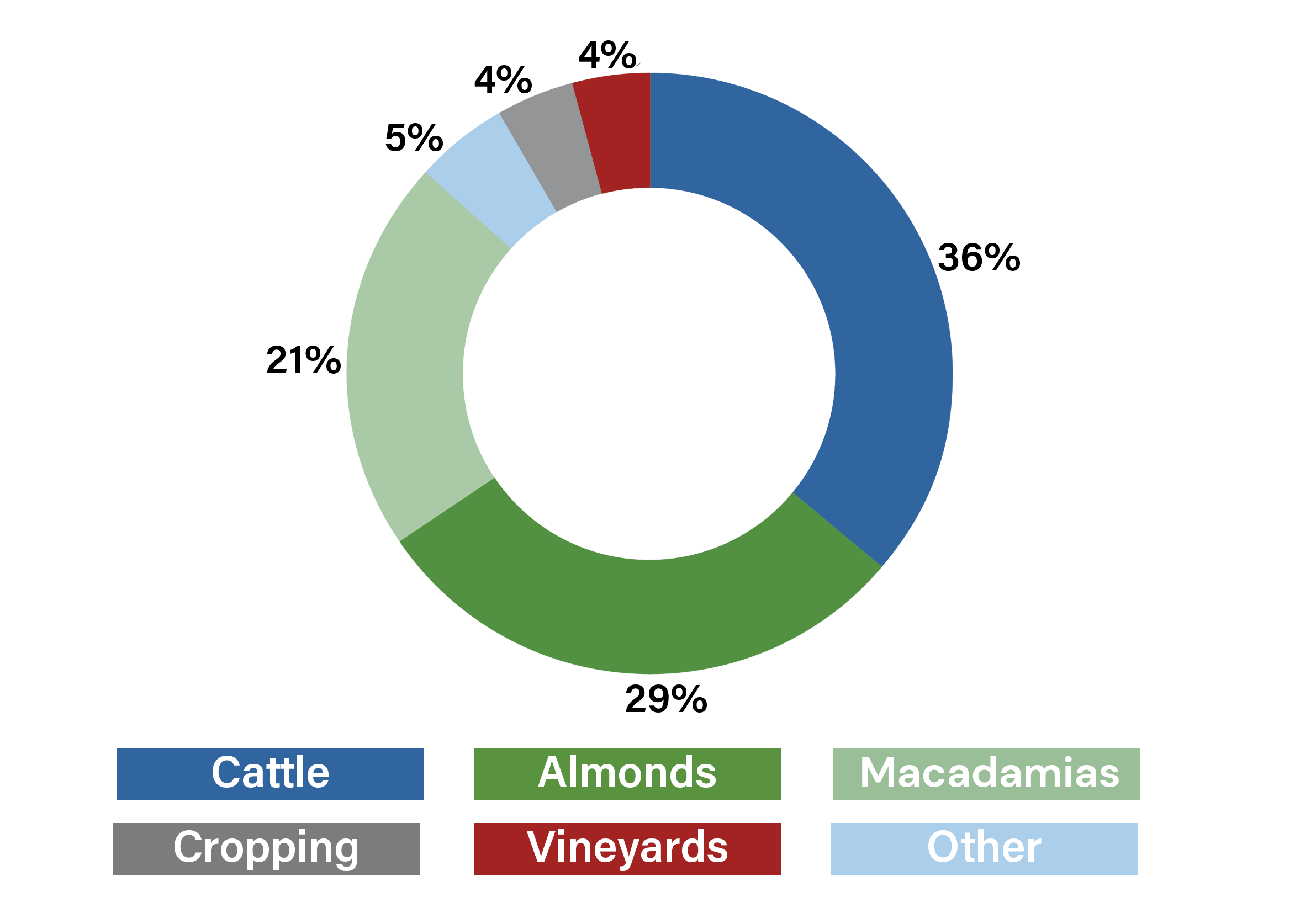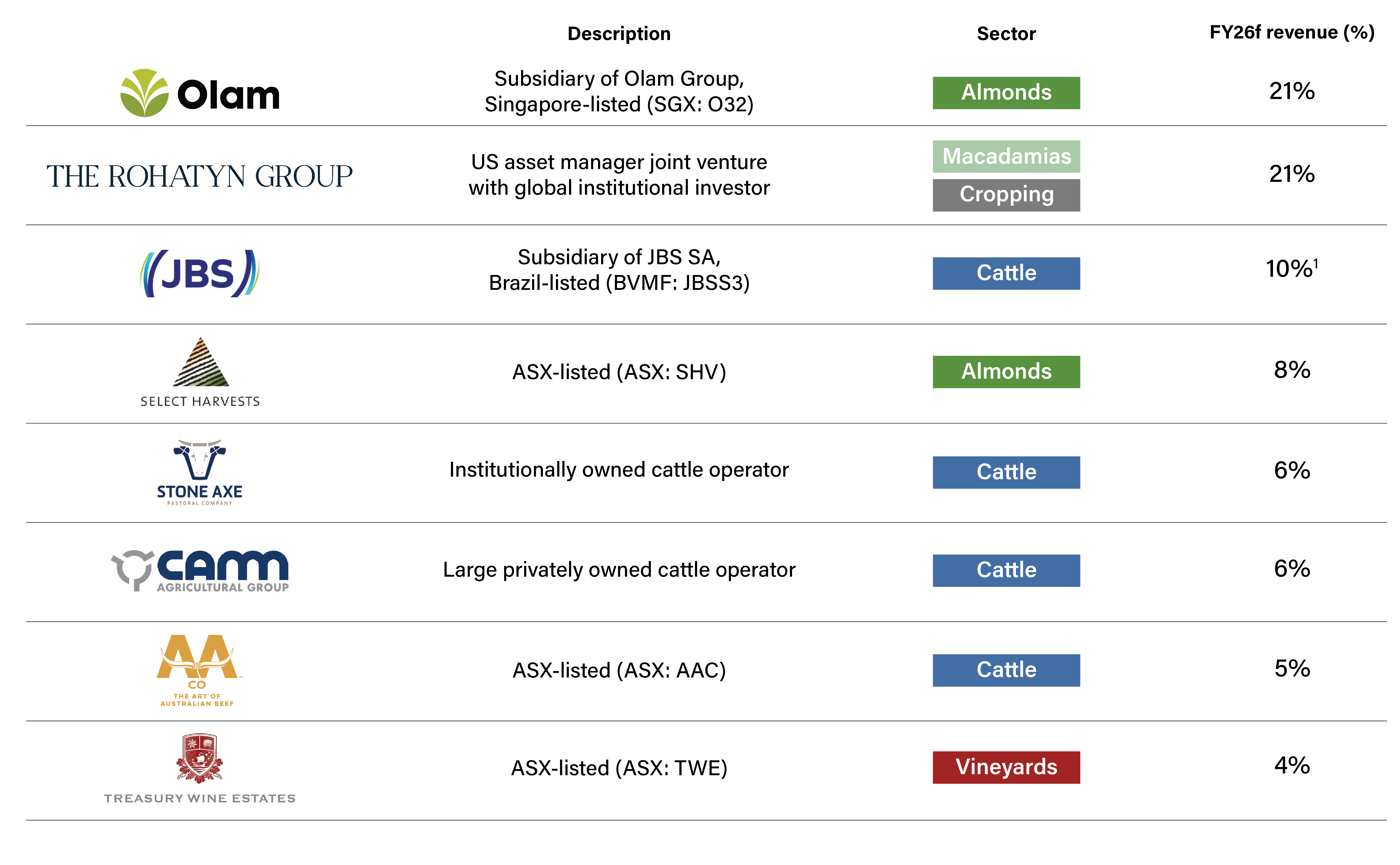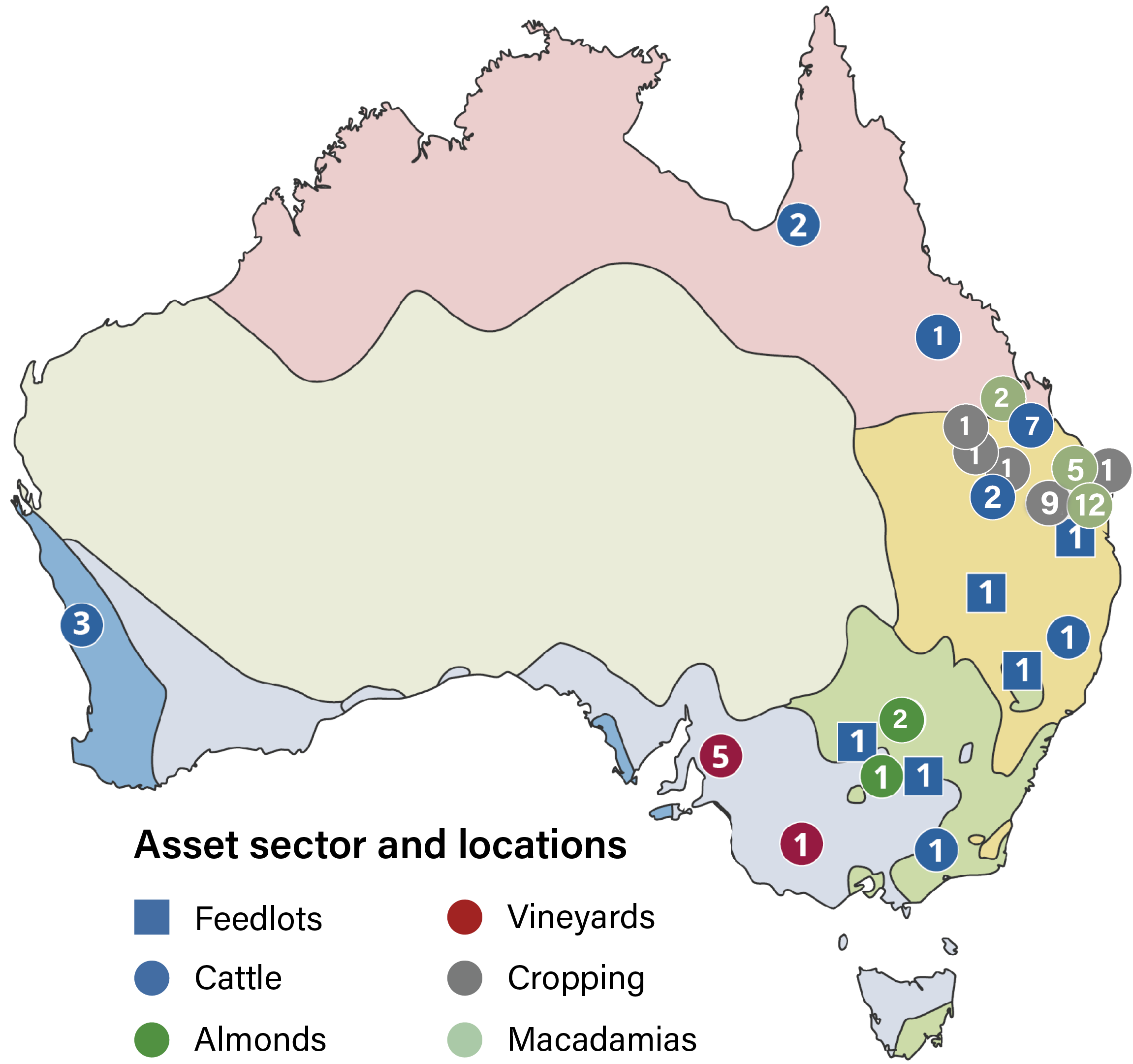-
Investments

OVERVIEW
Rural Funds Group (ASX: RFF) is Australia’s first ASX listed diversified agricultural Real Estate Investment Trust (REIT). RFF is included in the S&P/ASX 300 index.
ABOUT Rural funds GROUP
RFM is the manager of Rural Funds Group, an agricultural Real Estate Investment Trust (REIT) listed on the ASX under the code RFF. RFF owns a diversified portfolio of Australian agricultural assets. RFF’s strategy is to generate capital growth and income from developing and leasing agricultural assets. Distributions are paid quarterly.
RFF is a stapled security, incorporating Rural Funds Trust (ARSN 112 951 578) and RF Active (ARSN 168 740 805).
Key metrics
Metrics
30 June 2025
Adjusted total assets1
$2.1b
Total property portfolio1
$2.0b
Adjusted net assets1
$1.2b
Adjusted NAV per unit1
$3.08
Number of properties
63
Sectors
5
Weighted Average Lease Expiry (WALE)2
13.9 years
Gearing3
39.3%
FY26 forecast AFFO per unit
11.5 cents
FY26 forecast distributions
11.73 cents
FY26 forecast distribution yield4
6.0%
FY26f revenue by sector

Notes:
- Total assets adjusted for the independent valuation of water entitlements. Total property portfolio includes plant and equipment.
- Weighted average lease expiry, calculated as the FY26 forecast rent and the year of lease expiry (excludes J&F Australia guarantee fee, income from annual water allocation sales, operating income from owner–occupied properties and other income).
- Gearing calculated as external borrowings/adjusted total assets.
- Calculated forecast FY26 distribution of 11.73 cpu divided by the closing price of $1.95 (21 August 2025).
STRATEGY
Income growth is achieved through lease indexation, productivity improvements and conversion of assets to higher and better use.
RFF seeks to own a diversified portfolio of agricultural assets predominantly leased to corporate and institutional lessees. Historically assets have been acquired in sectors where Australia has a comparative advantage and RFM has operational experience.
Income growth is achieved through lease indexation, productivity improvements and conversion of assets to higher and better use. Distributions are paid quarterly.
Information on additional key elements of RFF’s strategy including lessee selection, diversification and acquisitions and developments is included below.
Lessees
Lessees predominantly consist of corporate and institutional entities, representing approximately 83% of FY26 forecast income. Several of these entities are also listed on domestic or international securities exchanges, either directly or via their parent entity.
Corporate and institutional lessees by sector

Notes:
- JBS revenue includes J&F Australia guarantee fee.
Diversification
RFM seeks to achieve multiple layers of diversification within RFF, including by:
- Asset type: this incorporates diversification across both infrastructure predominant and natural resource predominant assets. More information included under ‘Acquisitions and developments’.
- Climatic zone: climatic diversification moderates the likelihood of multiple lessees being exposed to adverse weather events at any one point in time (see ASX: RFF Climatic Diversification discussion paper 20 June 2016).
- Lessees: diversification of counterpart risk. More information under 'Lessees'.
Climatic diversification map

Note:
- Shaded areas denote climatic zones differentiated by rainfall seasonality (source: Bureau of Meteorology); see Climatic Diversification discussion paper dated 20 June 2016. Numbers in the circles/boxes on map show number of assets. Blue square boxes denote cattle feedlots.
Acquisitions and developments
The acquisition of additional assets that grow the quantum and diversity of earnings are considered on an ongoing basis. The investment strategy is to invest across the full range of the asset continuum shown to the right, with the objective of funding distributions.
Within various agricultural sectors, investment opportunities which may provide productivity gains or conversion to higher and better use have been pursued.
Both strategies aim to lift the value and income earning potential of an asset. The productivity strategy achieves this objective by enhancing a property’s ability to produce a given commodity. Whereas the higher and better use strategy aims to transform the use of an asset to a different, more profitable commodity. Put simply, increased productivity or production of a more valuable commodity enhances the ability of the operator to generate higher profits, leading to a higher valuation and supporting rents.
Spectrum of investment opportunities

Note:
- The income and growth figures presented in the chart above have been provided to differentiate the profile of income and growth that can be derived from different assets. They are based on RFM’s experience and historical observations of agricultural lease transactions and historical rates of growth. They are neither forecasts nor projections of future returns. Past performance is not a guide to future performance.
Manager
RFM has a depth of experience accumulated over 28 years acquiring, developing and operating Australian farmland, agricultural infrastructure and other assets. Sector experience includes almonds, poultry, macadamias, cattle, cropping, viticulture and water.
RFM employs over 250 staff and seeks to maximise returns through its experienced management team including specialist fund managers, finance professionals, horticulturists, agronomists and other agricultural managers. RFM’s key responsibilities in the management of RFF include:
- compliance to financial, farming and reporting requirements of leases,
- water asset management including obtaining approvals and engagement with government,
- management of infrastructure e.g. ongoing and development capital expenditure,
- coordination of regular independent valuations,
- facilitating acquisitions, and
- managing lessee/customer relationships.
Under the RFF constitution RFM is entitled to the following remuneration:
- management fee of 0.6% pa of adjusted total assets, and
- asset management fee of 0.45% pa of adjusted total assets.


